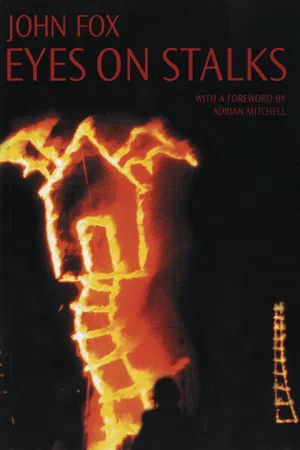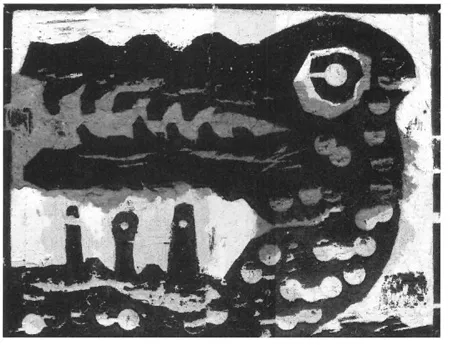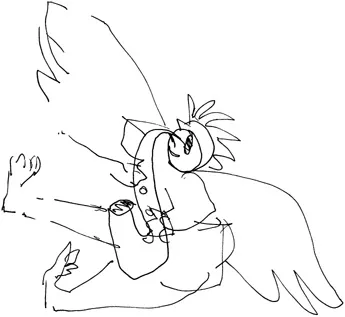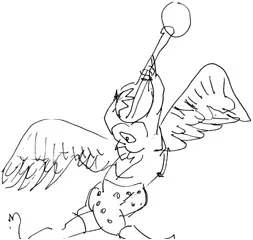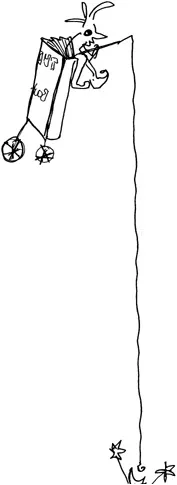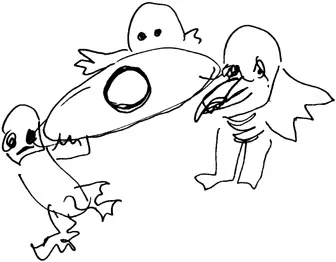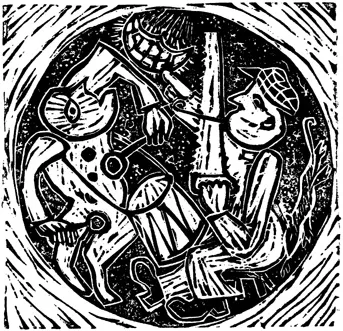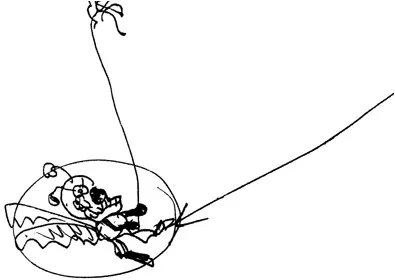![]() 1
1![]()
New Lamps for Old
Welfare State International is a diverse group of artists, musicians and eventmongers which, since it began in December 1968, has earned a living from the fruits of its imagination. Over a dozen of us,1 teachers and students working in and around Bradford Art College, took our art into the street in order to reach an audience who wouldn’t normally cross the thresholds of elitist theatres and galleries. Over a pint in a pub in Bradford, we borrowed the tag ‘Welfare State’ from the real welfare state (‘International’ came in 1979), recognising participatory socialism, where art would be as available and accessible as free dentures, spectacles and coffins. Since then, we have swung between the poles of populist performance art and applied anthropology. In 1972, our earliest manifesto, heavily influenced by the ideas of the Situationists and Marcuse, printed on silver paper hijacked from an elitist theatre, proclaimed:
AN ENTERTAINMENT, AN ALTERNATIVE AND A WAY OF LIFE
We make images, invent rituals, devise ceremonies, objectify the unpredictable and enhance atmospheres for particular places, times, situations and people. We are artists concerned with the survival and character of the imagination and the individual within a technologically advanced society.
Once we lived as outsiders on an ex-rubbish-tip in Burnley. From there, for ten years we toured widely in caravans, producing street theatre and pageants in bizarre forms with a circus tent. Then, we had the trappings of a tribe, with fierce make-up and alienating costumes to reinforce our identity. Thirty-four years later, our original intentions still hold, although we now have a more global and environmental perspective, and are more integrated with our town community. Now we are more apparently respectable, with a customised headquarters in an old Victorian school called Lanternhouse. Recently refurbished with a £1.6 million Arts Lottery award, Lanternhouse is located on the Furness Peninsula in Cumbria, in the centre of Ulverston. It has studios, exhibition spaces, accommodation, a library, coffee shop, courtyard, gardens, towers and bridges, and a separate warehouse, computers, a database, a well-staffed office (with business, marketing and centre managers), brass plaques, burglar alarms, and architectural awards, the only tent being a miniature one for the office cat. All these are a long way from the trailers of 1968, although my office is a garden shed on the roof.
Now, there is also a considerable network of hundreds of like-minded people, some of whom worked with us years ago, some of them running extraordinary visual theatre companies. Many others have been part of the UK celebratory arts movement, regularly documented in MailOut,2 which has also spread to communities and institutions world-wide.3
Eyes on Stalks, however, is not about wallowing in the past. Every era courts the myth of a lost Golden Age. Nostalgia dulls reality. Most of the interpretations of Lake District history give us only what is comfortable and sterile, with little mention of rural poverty or the slave trade. In terms of satire and social comment, it refuses to venture beyond the Toby jug. Ulverston chooses the safe theme of Dickens for its winter festival, suppressing most of his social and artistic relevance and reducing him to an icon of the heritage industry – top hats and starched mobcaps, fantasies that prop up tourism, shopping and the Christmas market, with not a beggar in sight. At Brantwood, on the shore of Coniston Water, despite the efforts of the dynamic curator of his home, John Ruskin is still mainly a museum and tea shop. At the nearby architectural treasure Blackwell, influenced by William Morris, there is none of his radical socialism. Wordsworth’s once revolutionary zeal is not obvious even at Dove Cottage. Nostalgia can be a tool of authoritarian centralism which maintains the old order and demonises the dissenting underbelly. So, if I look back, it’s not in nostalgia, but only to offer tools, models and lessons for the future.
In the sixties, everything seemed simpler. You could literally afford to be radical. We weren’t paying back student loans, unemployment was rare and with legwork you could earn a wage if not a living. Optimism, hope and the right and need to change everything was in the consciousness of a small but vocal, active and committed minority. If we were all in any case about to be annihilated instantly in a nuclear war, what had we to lose? If we were to change everything, though, we had first to survive. Targets were straightforward – Americans in Vietnam and racial equality in South Africa and the USA. The Cold War and the threat of nuclear annihilation, the two big sticks keeping most people in order, also triggered change.
The totalitarian post-industrial world with its ‘comfortable, smooth, reasonable democratic unfreedom’, as Marcuse put it in his One Dimensional Man, maintained by the very technology that could free us from toil and ignorance has not gone, despite the lessening of the threat of nuclear war.4 In 2002, 20 per cent of Britain’s population is still marginalised, existing on sink estates, with poor schools, work that is non-existent or menial and exploitative, and thousands are deprived of the fashionable technological, social and financial skills necessary for a lucrative career. The kind of lucrative career in which Tony Blair can award himself a 41 per cent pay rise, from £116,000 to £163,000. An increase equivalent to nearly five years’ pay for anyone on a minimum wage but not unusual for hundreds of top managers, and small change for a few professional footballers. Socialism and protest in 2002 may not be dead, but it is looking even more anaemic than in 1968, especially for Carlo Giuliani, the twenty-three-year-old dissenter killed in Genoa during the G8 summit in 2001.5
We are offered a dazzling array of apparent choice, but even political radicalism, alternative religions, drugs, pornography, sadism, tourism and art products are cogs in a cultural machine. The argument continues that the new big sticks (now wielded by multinationals, the media and information technologies) dominate our imagination with money, branding, packaged care, gratuitous entertainment and the scratch-card fix. In our kind of democracy many people, particularly young people, believe their voice is unheard. Tony Blair, speaking in Genoa about street protest, said that ‘normal people’ should be back at home with their families, leaving it to their elected representatives to bring about change – this after the election with a 40 per cent turnout, one of the lowest in recent British elections.
Isolated in front of the telly, we are fed so-called ‘reality’ TV and soap voyeurism with no possibility of exchange or gift relationship. Our dreams and open-ended imaginations are stolen from us to be sold back as closed, expensive and manufactured fantasies. Some people are more liberated sexually, morally and financially than in the sixties, but there is a legacy of fear, a perception that violent crime is rising, considerable depression and loneliness linked with the breakdown of family, universal credit-card debt, confused value structures and the purely hedonistic use of drugs and sex. Commercial football is increasingly gaining the power and role of a dominant and expensive religion.6 As if all that were not enough, we are now encountering the ‘double-edged’ sword of technology.
Television, information technology and mobile phones isolate us physically, if not mentally. We communicate excessively, about less and less, and generate stress for ourselves with information overload. At the same time, though, the world-wide web and e-mail has also facilitated the anti-globalisation movement. Subcomandante insurgente Marcos’s words were picked up by the electronic picture desks of colour supplements as radical chic.7 The media may be insatiable and amoral, but video pictures of massacres in Bosnia, Rwanda and East Timor, as well as world-wide famines and floods, have also made us aware of wars, debt repayments and climate change. Our awareness is not powerless. Contrary to popular belief, the numbers of wars and their scale and length are decreasing.8 The breakdown of institutionalised church-going we are experiencing in England could be fuelled by media images of the ascendance of religious fundamentalism which seems to fuel hatred, terrorism and war in the USA, the Middle East and Northern Ireland.
Eyes on Stalks is undoubtedly political, but I hope it is not a tract. It is primarily about experiments in theatre, performance, community art and rites of passage that have sprung from the momentum of a rollercoaster of issues. Welfare State International has increasingly moved away from models of theatre and performance of the spectacle, however inventive, to models with a different social purpose. Always balancing on a seesaw between a social agenda and aesthetics, we have researched ways of making art work in a community context, connecting patterns of living with aesthetic and stylistic invention, maintained playful and imaginative modes of seeing (and being); looking for ways to make work itself more creative. In the process, we have stumbled across a few life-enhancing prototypes. Despite the large outcast underclass and the increasing gap between rich and poor people in Britain (and between nations of the world), some aspects of our culture have improved. We have contributed a tiny amount but it has been significant for a few people.
The fifties were dull. We were still recovering from World War II. In the sixties, racism, sexism and bullying were rife. Women and young people in particular were often oppressed by the nuclear family structure. Empire and National Service went. The Pill came. Abortion and gay rights were legalised and university education widened. Half a century on, some things are better. Now it is rare for street performers to be arrested, as was common in the early seventies. Far from it. Today, clowns, jugglers, stilt-walkers and carnival troupes are avidly hired. They are all-Dayglo, all-dancing doorknobs that open every shopping festival in every lookalike mall from Barrow to Milton Keynes. Now there are hundreds of excellent entertainment and music festivals, local authority play buses, community art agendas, lantern parades, fire shows, pyrotechnic turn-ons, an increasing number of alternative rites of passage (namings, funerals and weddings) and even one or two established but imaginative undertakers designing attractive coffins. Today the concepts of ‘access’, ‘multigenerational’ and ‘diverse’ participation are built into every arts-funding guideline. Although these concepts have become institutionalised, with politically correct agendas, the overall picture for artists and communities has improved.
The issues of today may seem less overt. Maybe we are anaesthetised by inertia, while our vision is channelled through consumerism, linear education, too much fake choice and a residual cynicism and insecurity left over from Thatcher’s Grocerism and Greed, but the issues are no less real or urgent. They include environmental degradation, global warming, the domination of multinational brand logos, the marginalisation and relative poverty of 20 per cent of the UK population, the exploitation of economically poorer countries and people, AIDS, uncontrolled population growth and inevitable terrorism.9
Our journey has always been informed by these agendas.10 We have made many practical experiments (and mistakes). I hope we continue to learn lessons and that the questions we have asked and the prototypes we have discovered are of use to others. If, as André Breton put it in 1928, ‘The poet of the future will make dreams concrete’, then it is a privilege to pass on the fruits of our labours.
![]()
Cheap Art
Long before anyone thought of the famous West Indian carnival in Notting Hill, Peter Schumann and his Bread and Puppet Theatre from New York were enacting A Man Says Goodbye to his Mother. In 1965 on a grey street corner, working in drizzle and against traffic noise, the company engaged passers-by with a tough five-minute fable about the Vietnam War. I had never seen anything like it. John Arden and Margaretta d’Arcy1 and the Olivers2 at Oval House were responsible for the visit. It was the trigger that inspired me to start Welfare State International.
Simple, direct, monochromatic backdrops painted on white sheets depicted an Asian village. A narrator with a skull mask carried a bag of props. There was a trumpeter, also in a skull mask, and a mother in black with a silver-grey face mask. The son marched to war to the time of a drum and was shot in the arm. The narrator replaced the mother’s mask with that of an oriental woman. She became a woman from the village. As the land was dangerous, the narrator explained, the son needed weapons and he gave him a gun, a gas mask and an aeroplane.
He whirled this round his head on a string while the cast imitated the buzzing sound of engines. The woman looked to the sky. The narrator gave the woman a plant, but the son poisoned the crops (a cloth was dropped over the plant). Then the son first tore up a cut-out of the woman’s house and finally killed her child. Carefully the woman placed the dead child on the ground, pulled out a pair of scissors and stabbed the son through the heart. Standing over the dead son, the narrator covered his face with a sheet and, after a long pause, he and the woman, now both wearing skull masks, carried off the dead boy’s corpse.
The audience of twenty-odd were stunned. Even the traffic seem stilled. Here was truth and risk and simplicity and necessity. Every word that Peter Schumann has ever said about his work is thought-provoking:
We don’t necessarily have to revolutionise theatre. It may be that the best theatre will develop from the most traditional forms. A theatre is good when it makes sense to people … I feel that art in the modern world is generally superfluous. Either we should find a true need for it or give it up. We named our theatre the Bread and Puppet Theatre because we felt that theatre should be as basic as bread!3
Peter is a saint. Over the years, our paths have crossed occasionally and I never feel I am up to his moral stance. In the autumn of 1999, Pete Moser and I were invited to a conference in New England. After our efficient and dutiful presentations to rows of suited administrators and a few professional artists, we escaped to Vermont, to the farm where Peter fed us on maple-syrup pancakes.4 The trip was liberating. Boys in a Cadillac with Buddy Holly on the sound system, big empty roads and even emptier hills burning golden in the fall. ‘Why are we doing what we do?’ we kept asking ourselves in our usual dialogue about Art and Society. And the Bread and Puppet Theatre yet again showed us the way to our next adventure.
Peter and Elke Schumann and their dedicated family and followers had had a difficult year. After more than ...
